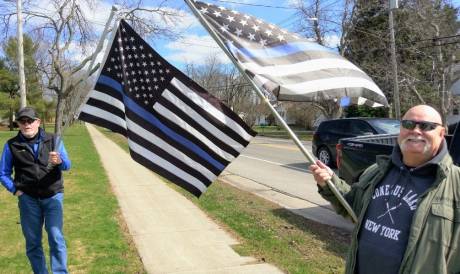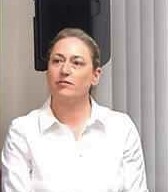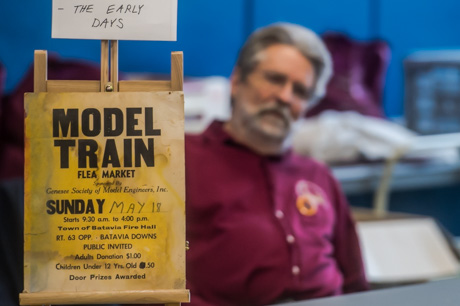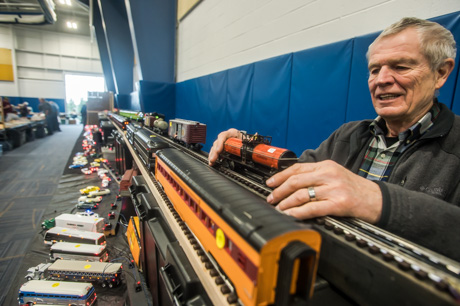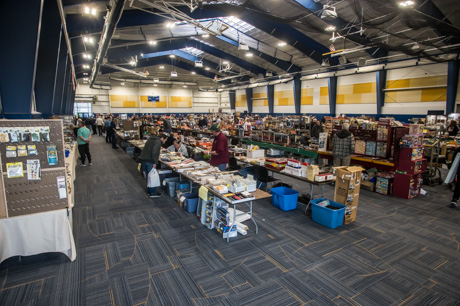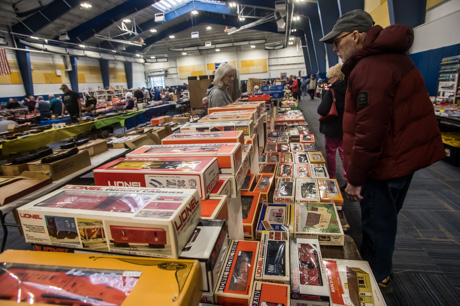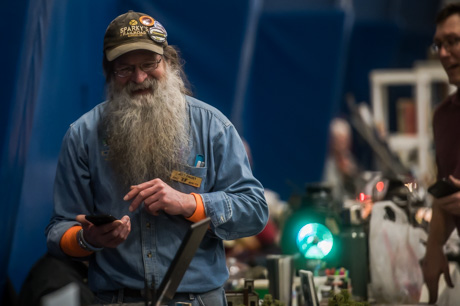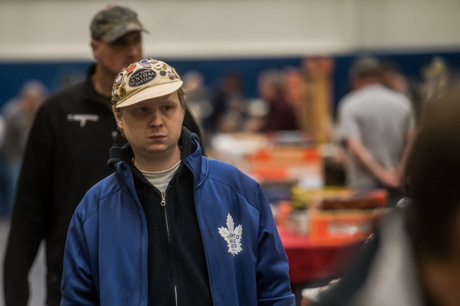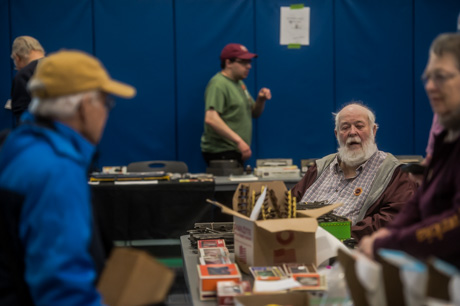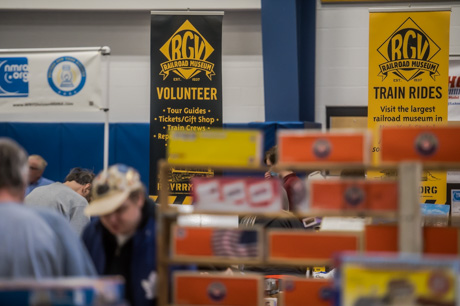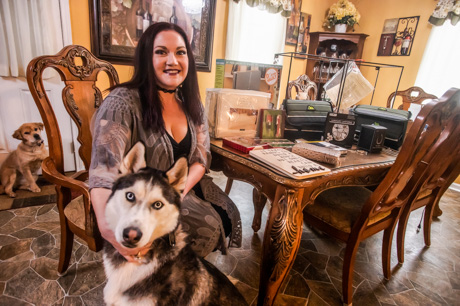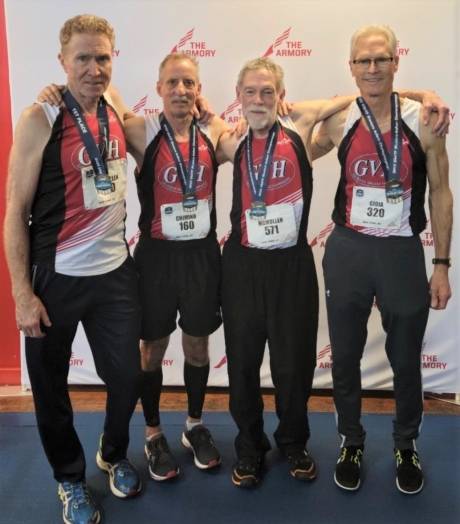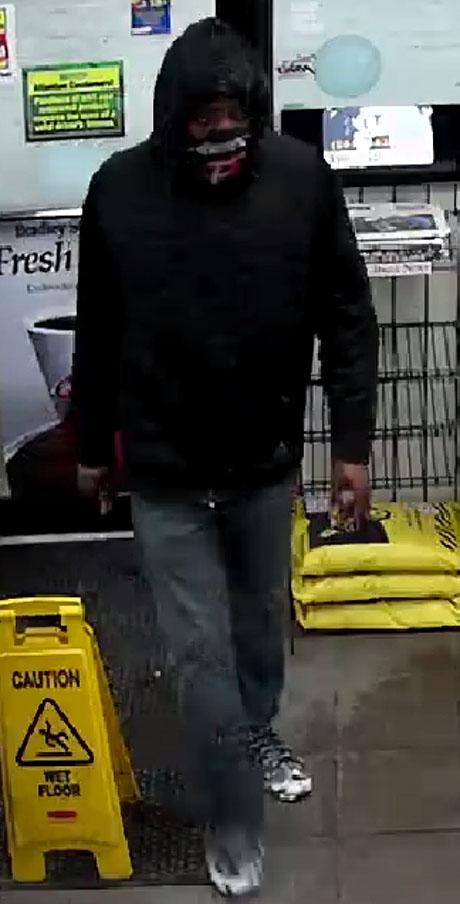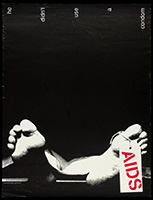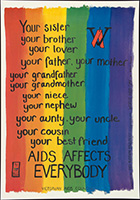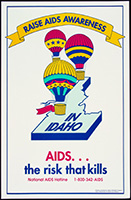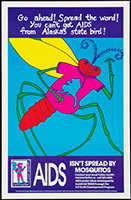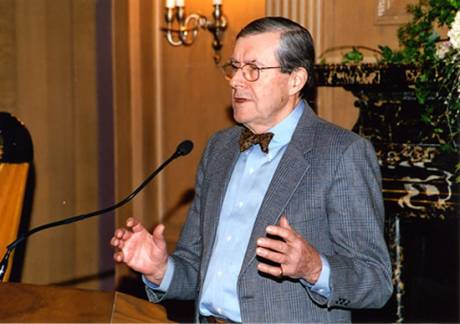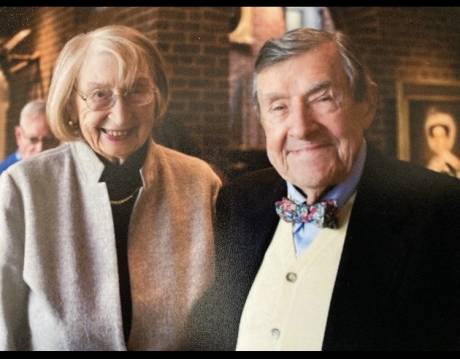Dr. Edward C. and Ruth Atwater. Photo courtesy of Rebecca Briccetti
Edward C. Atwater’s home — initially in Batavia and later in Rochester — was a dead giveaway of his passions.
The late doctor and medical historian kept collections, from thousands of books and print materials to thousands of architectural slides and posters, throughout his and wife Ruth’s home from top to bottom.
Ned Atwater knows the posters well. Collected by his dad on the topic of AIDS for decades, Ned at one point counted out 6,500 duplicates while the artifacts were being organized.
“He never boasted about it at all … it’s the largest collection in the world, and he could have cared less. It was about the messages and content, and he was the messenger,” Ned said from his home in Canandaigua during an interview with The Batavian. “It was important that he collected it and got it out to the public.”
Attending the debut of a six-years-long project that, at last, puts the senior Atwater’s efforts on proper display at Rochester’s Memorial Art Gallery, was “super emotional,” Ned said.
The exhibit, Up Against the Wall: Art, Activism, and the AIDS Poster, is a collaboration between Memorial Art Gallery (MAG) and the River Campus Libraries at the University of Rochester. It runs through June 19 at the Gallery. (See related article, "Former Batavia resident's collections ..." )
Exhibit curators and editors chose 165 samples out of the 8,000-poster collection. Ned had seen “all of those,” he said, and remembers Christopher Hoolihan’s frequent visits to their home. Hoolihan was rare books and manuscripts librarian at the Edward G. Miner Library at the University of Rochester School of Medicine & Dentistry.
“And he'd come over every Monday night for 20 years to my parents house, and my mom would cook them dinner, and then they’d go down to the basement, which is where the book collection was, and they'd work on the books,” Ned said. “And the AIDS poster collection was in the attic, and so Jessica (Lachman, co-editor of the collection’s book) would come over. Jessica was there every Tuesday, so I got to know her quite well. Those were a couple of important people in the same collecting sphere that he was in.”
Collections, Donations ...
Atwater’s collections have gradually made their way to the University of Rochester as prized relics of medical history. AIDS took hold in the 1980s, and Ned clearly remembers how little the government was doing to prevent or raise awareness about it. Organizations across the globe, including municipal health departments, began to create posters as visual reminders of the life-threatening AIDS epidemic.
Dr. Atwater didn't start collecting posters until 1991, and was in his mid-60s by then, Ned said. Three decades later he was still collecting, shortly before he died in 2019 at 93. Posters are from many countries in multiple languages, and they stray from one another by colors, images, wording, message and target audience. Ned attended the debut with his sister, Rebecca Briccetti, of New Hampshire.
“Rebecca and I went into the show, we were, I think, both astounded at the show itself, the professionalism in which the Memorial Art Gallery had done it. And, you know, just the messages that it all conveyed. It was really a very good overview of the AIDS posters over history. I thought it was just so well done,” he said. “And the people at the Memorial Art Gallery even told us that in a visual sense, they think it's the best show they've ever had. ‘Wow,’ we thought, and we were pretty surprised and humbled by that. My father would be absolutely thrilled.”
The collection of posters fills in the story, from graphic pictures of men and condoms to more generalized messages that no one is immune to the disease. It was such a heavy and insidious topic and disease that took hold in a public that was ignorant of its causes, symptoms, and life-threatening nature of it.
“The AIDS epidemic really hit hard. My father was in touch with Dr. Fauci about it,” Ned said. “I had a lot of friends in the gay community in Oregon. One of the biggest turning points was that it wasn’t just in the gay community.”
While Edward C. Atwater was a renowned medical historian and collector, he was also “such a humble guy,” Ned said, someone who took the time to listen during a conversation, take an interest and ask thoughtful questions. Those traits fed his desire for knowledge and details, and he often acquired them in the forms of various rare books, patented medicine bottles, organ pipes, architecture slides and AIDS posters.
“It was important that he collected it and got it out to the public,” Ned said, addressing the poster varieties. “It was a visual thing; some are really funny, and scary, compassionate. Some of the most graphic ones are from Germany and France.”
Those displays may have been more explicit, he said, but the messaging was effective.
Recalling Batavia and the farm ...
Although Ned’s father and mother moved from Batavia before Ned’s childhood, he recalls the fun times he and his sister Rebecca had visiting the small city and Genesee County. The siblings also visited their mother’s homestead farm in Stafford. There were horses, sheep and “the smell of the barn,” Ned fondly recalled. He and his sister would take the bus from Rochester to Batavia and visit both sides of the family.
“I used to love to go there, we’d go on a whim on the weekend … hanging out in that big old house, and we’d sneak over to the RCA factory to see the color TVs,” he said. “You really can't mention my father without mentioning my mother; they were married 67 years, and she was really my father's wing woman.”
One thing his father didn’t do was to push Ned into a similar career path. There was no cajoling or needling on the topic, and Ned’s career took him down a more artistic path as a furniture maker. He and his sister fondly remember taking the bus from Rochester to visit their grandparents, Edward P. and Rowena Atwater, who lived in the well-known Atwater House on East Main Street, a rambling structure that accommodated extended family and the constant presence of dogs, Rebecca said.
Ned often preferred the country life in Stafford, where his mom Ruth grew up. She and Edward C. married in 1951 and lived in Batavia, where Edward grew up and attended school. The couple later moved to Rochester closer to his workplace, the University of Rochester Medical Center.
Briccetti was looking at a screenshot she had taken of her father’s childhood diary, with notations about current events and the $5 his grandmother gifted him. He noted when the Hindenburg crashed in New Jersey while carrying 99 passengers.
“What a thing for a little boy to write,” she said. “I’m just completely going down memory lane here.”
The Renaissance man, The Godfather ...
A part of that memory bank includes how much his parents embraced people, from children to adults, with their generosity and care for humanity. So much care, in fact, that Dr. and Mrs. Atwater were asked to be godparents to at least a dozen children, including Kathleen Harleman, Director Emerita of Krannert Art Museum, University of Illinois. Her parents became good friends with the Atwaters and thought there would be no couple better for the symbolic guardian role than Edward and Ruth.
“I always thought of Edward as a Renaissance man or polymath, a person with wide-ranging knowledge and interests in many fields and deep expertise in several areas,” she said. “He epitomized the characterization, being highly educated, a gentleman, cultivated in the arts, and immensely charismatic. Edward’s professional and personal practice, teachings, writings, and collections extended beyond internal medicine (specifically rheumatology), to embrace the history of medicine, as well as major health reforms and global activism.”
Later in life, Edward wrote Women Medical Doctors in the United States Before the Civil War: a Biographical Dictionary. Harleman loved that his efforts “highlighted these female pioneers,” she said. She came from Illinois to see the exhibit, and rated it as “superbly conceived and presented.”
“They explore multiple aspects of the subject with a truly impressive range and depth of voices and expertise. The individual contributions of writers in the publication and for the QR codes in the exhibition are very powerful, as is the exhibition design of the installation and the book's graphic design,” she said. “Edward would have been happy and impressed with the levels of thought, care, and execution that have gone into the exhibition, publication, and programming. My hope, shared by many others, is that this exhibition will travel globally.”
Given his proclivity for research and detail, it may come as no surprise that dinners at the Atwater home included open conversation “about pretty much everything,” Rebecca said. However, she learned more about HIV and AIDS by reading about it for herself.
“The crisis became apparent for what it was … so I didn't have to hear about the AIDS epidemic and HIV from my father, I was reading about it myself. I was living in New York City, a horticultural and culinary editor at the time. And I was reading about it. Rolling Stone Magazine did a very important job in communicating the urgency of this emerging crisis and a lack of national attention, and political attention,” she said. "I know there are a lot of people still out there that really associate this as being a gay disease. And there's still an enormous amount of people there that just don't understand it. And my hope is, this is going to provide good information and change those misconceptions if it's possible. Still, the poster has as much power as anything, you know, to change people's minds, or just to make them realize basic things about AIDS.”
Her father loved to play piano and organ, and sang as a youngster in choir, she said. His collection began then, with organ pipes, and later one of his first collections was of patent medicine bottles, which he researched, and then wrote papers on the patented medicine purveyors, she said.
“He just loved that. And then finally he and mother realized, you know, this is just too many bottles, this is too big a collection to keep. And they gave it to the university,” she said. “And from there, he moved on to a different kind of collection. And that was medical trade cards. I mean, my goodness, I remember coming home from school and, instead of picking up a comic book, or you know, a favorite young adult fiction book, or maybe working on your math homework, I would eat an afternoon snack while leafing through these enormous bound books of plastic pages into which father was keeping his medical trade card collections. And he was constantly adding to them for years until my mother realized this is just too much to keep at home … and they gave those to the University of Rochester. I think during all of this time, as an historian, he was interested in collecting ephemera in the realm of popular medicine. And that became a thread through his entire historical collecting life.”
It was a passion he was devoted to until he died at age 93. Shortly before that, Rebecca’s husband Fred took him out on a snowy day in New York City and Greenwich to scour collector’s shops. Atwater talked to fellow antiquarians, and they would step out from behind their display tables to say “Dr. Atwater, it’s so good to see you.”
“Obviously surprised that this ancient gentleman would be still out looking for more material," she said. "It was very moving.”
